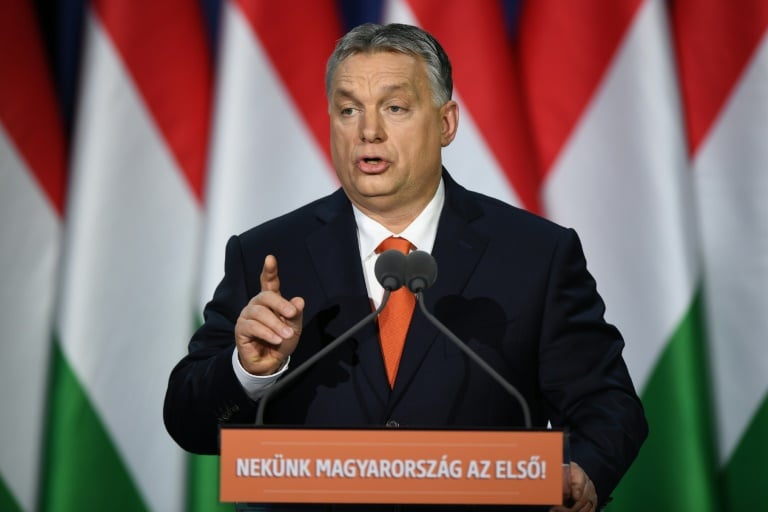SCA acquits man of rape after overturning his friend’s 20-year conviction following multiple appeals
The man, shouting slogans at passers-by that are sometimes used by the government, may sound ridiculous, but that’s because he’s meant to be. He’s a character from a YouTube video created by young comedian Tibor Bodocs.
“The central Asian, post-Soviet, illiberal atmosphere of Hungary under Orban is ripe for parody,” says Bodocs, the hardest-hitting of a new wave of young comedians tackling politics.
His remark refers to a landmark 2014 speech by Hungarian Prime Minister Viktor Orban, in power since 2010 and on course for re-election on April 8.
In it, Orban said he was moulding Hungary into an “illiberal state”, citing Russia and Turkey as models.
Since then he has tightened his grip on media and other institutions and launched a series of campaigns featuring billboards on almost every street. They warn about Brussels interference and liberal US billionaire George Soros whom Orban accuses of alleged efforts to force migrants on Hungary.
“I make it all look ridiculous, and try to make those who believe in the propaganda think twice,” Bodocs told AFP after a show in Dunakeszi near Budapest, part of a recent sell-out national tour.
During an intense hour-long routine the lanky 35-year-old fired off scathing impersonations and skits targeting Orban and oligarchs in his circle, with the audience of some 500 people laughing throughout.
Last year Bodocs began adding short video clips to his repertoire.
“More people can watch material on a smartphone at a red light than come to a show,” he said.
A popular clip featured a parody of Lorinc Meszaros, a former gas-fitter and close ally of Orban and now one of Hungary’s richest men, reciting a love poem in honour of his friend.
The character fulminating against foreigners in his car “is the subconscience of Orban’s system, surfing the waves of propaganda, driven mad by fear of anything non-Hungarian,” said Bodocs.
“Viktor’s themes like foreign threats and Muslim invasions are primitive, but strong, opposition politicians simply can’t compete,” he said, when asked why he focuses on Orban.
– A ‘comical’ god –
Bodocs occasionally performs at the Dumaszinhaz comedy club in Budapest, where in recent years regular political comedy nights have seen comedians improvise on the latest news.
A recent cabaret included sketches on the 10 best ways to waste EU funds, the anti-migrant wire fence Orban erected on Hungary’s border, and the prime minister’s closeness to Russian President Vladimir Putin.
“These days you hear more truth from the comedians than from the politicians,” Zsigmond, a 32-year-old engineer told AFP during a break.

The comedians target Hungarian Prime Minister Viktor Orban who has tightened his grip on power since 2010 and is on course to be re-elected on April 8.
The Dumaszinhaz team has also produced viral clips including satirising one of Orban’s own regular Facebook videos in which he visited an adoring pensioner in a village.
“It’s fun to play this guy, a god in his own comic way,” Orban mimic Andras Peter Kovacs, 39, told AFP. “There is something strange in him, distorted by being in charge for so long”.
Gergely Litkai, 41, who runs the club, says that during the migration crisis they regularly mocked government policies instilling mortal fear of migrants.
“We tried to convince people to think a little deeper,” he said.
In recent months widespread alarm over the issue has led to the police being called after Sri Lankan student volunteers at a home for the disabled were mistaken for migrants.
In another incident, a countryside hotelier who offered to host some refugees had his car tyres slashed by fretful townsfolk.
Orban later said the locals’ anger was understandable and “very right”.
– ‘Keep people sane’ –

Comedians focusing on Hungarian politics such as (L to R) Laszlo Hadhazi, Gergely Litkai and Andras Peter Kovacs perform on the stage of the “Dumaszinhaz” in Budapest during a popular political cabaret.
Neither Bodocs nor the Dumaszinhaz team say they have political ambitions but one group of satirists has taken the plunge and plans to run around 60 candidates at the upcoming election.
Set up as a party in 2014, the Two-Tailed Dog Party (MKKP) has until now focused on urban graffiti.
Its leader Gergely Kovacs, 38, told AFP that “the political atmosphere is so hate-filled it needs humour to keep people sane, one supporter told us we were the reason he hadn’t left Hungary”.
In 2016 when the government sought approval at a referendum of its rejection of the EU’s migrant quota system, over six percent of the electorate heeded the MKKP’s call to spoil their vote: “a stupid answer to a stupid question,” said Kovacs.
The result — 98 percent of those who voted backed the government, a “sweeping victory” according to Orban — was declared invalid due to low turnout.
Download our app